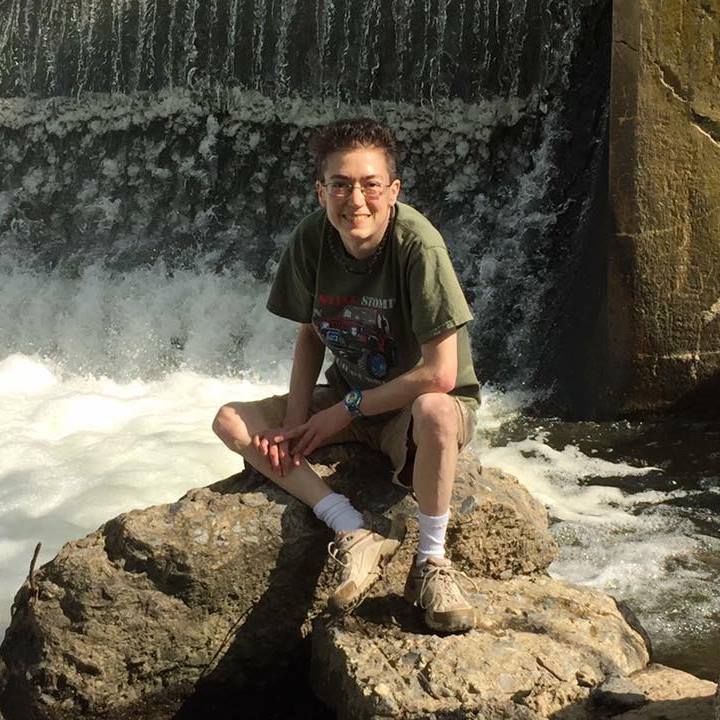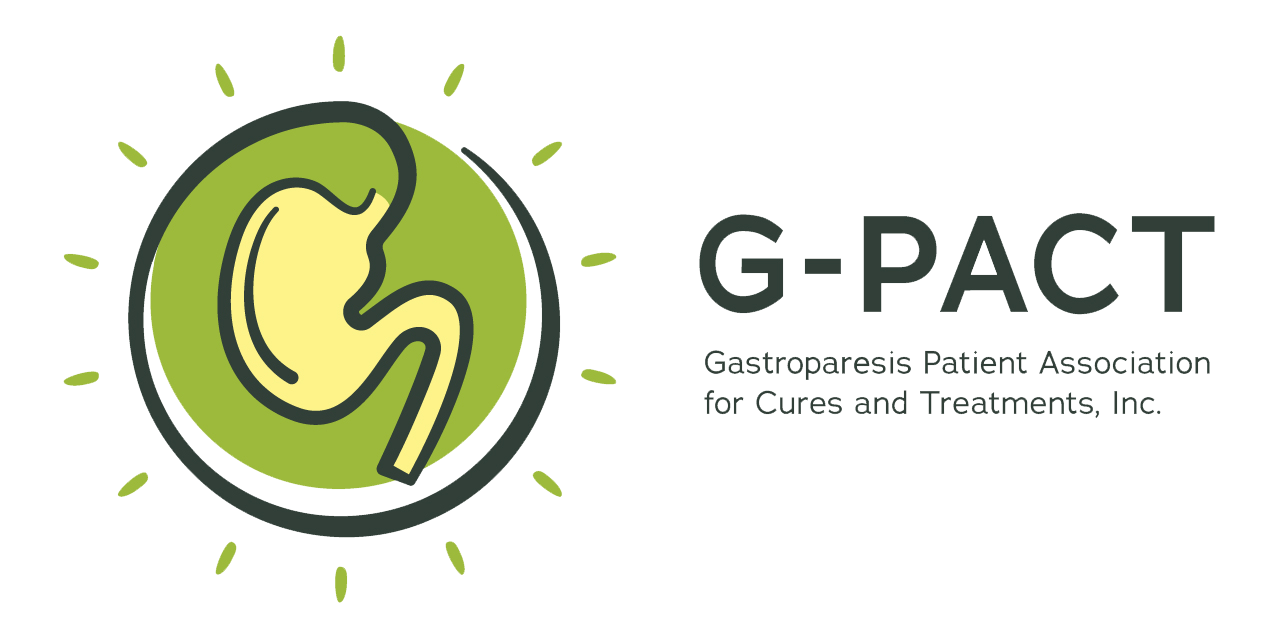Meet the Team: Carissa

For our final Meet the Team post, we have our founder, Carissa Haston.
– What is your current role with G-PACT? President and Director of Creative Productions
–What brought you to G-PACT? I was diagnosed in 1994, at the age of 17. At that time the internet was in its infancy, and no online resources were available. I was not able to connect with anyone else who had GP for years.After I graduated from college in 2000, I had plans to go to grad school for Art Therapy. When I realized I was not going to be able to go due to my health, I used my graphic design knowledge and decided to start a personal website to showcase my art, share stories about my life, and reach out to others with gastroparesis. I started to get so many contacts through my website that I couldn’t respond to everyone! That’s when I decided to start a Yahoo group so a number of people could communicate with each other and discuss life with GP.I expected to get about 50 people in the group. Within just a few months, there were several hundred! After a year with close to 1,000 patients, it became clear we needed a non-profit dedicated to dealing with the challenges of GP and seeking a cure.
As leader of the Yahoo group, I was able to bring together a small handful of people who were interested in helping in the founding of G-PACT. I was unanimously nominated to take on the role as President. We started initial meetings around March 2001 to discuss mission, goals, and develop ideas on how to operate. On August 23, 2001, I walked our Bylaws, Articles of Incorporation, and other legal forms into the PA Department of Charities, making us authorized to officially begin operating as a 501(c)(3) non-profit.G-PACT has changed some over the years due to growth, change in leadership roles, adding additional conditions, and gaining high respect and popularity in the gastroparesis world. However, the core of G-PACT has never changed. G-PACT has a heart and unique personality which is appealing to patients who are struggling. We are all volunteers who in some way are dealing with gastroparesis, chronic intestinal pseudo-obstruction, and/or colonic inertia. Knowing that a cure could take years, even decades, we understood that patients had unique needs that the medical community could not address. Our mission is to provide resources to patients to help manage Digestive Tract Paralysis as well as possible now, while we advocate and fight for a cure.
-How long have you been with G-PACT? As one of the founders of G-PACT, I have been with G-PACT for 18 years. I am the only founder who is still volunteering with the organization.
–If you were stranded on a desert island and could only take three things, what would they be and why? Well, considering Wilson floated down the ocean in Castaway, I don’t think I’d take a volleyball.
- I’d take another person. Two people are more likely to survive together than one, and each will have unique skills which will make working through survival techniques easier. Plus, the second person is allowed to bring three things too, right? So, that increases the number of items we will have available, especially if my person brings someone else along too…and so on…:)
- I’d take a knife to hunt small animals for food. It would be more useful for me than a large knife. I could make tools I need to build items, cut wood to TRY to get a fire started, and make weapons to protect myself and the person with me. Eventually, I could build a boat using a combination of the natural resources available and get us all off the island, or send one person to go find help! A knife is crucial!
- Assuming I’m surrounded by saltwater, I’d take a filter to get rid of the salt in the water and any potential bacteria. I can’t survive an island for long without water, especially if it’s in a region where I won’t get much rain or snow!
–Who has inspired you most in your life and why? My parents. I wouldn’t be alive if not for them. They have always been around for me when I’ve been so sick, provided for my needs when I couldn’t do it, and have stood up for me against medical professionals when I haven’t been able to do it myself. They have spent many days and nights with me in the ER or hospital sleeping on hard chairs in uncomfortable positions.One of the most inspiring aspects of my parents is how their marriage has carried on in spite of how sick I have been, and years when they were separated while I was away for medical care. Most marriages in which a child is seriously ill end in divorce under normal circumstances. In my case, my mom moved to Pittsburgh with me for two years while I was waiting for a five organ transplant. My dad stayed in Harrisburg to work. Although he made occasional trips to Pittsburgh, they were limited. My mom was not able to leave me to go to Harrisburg to be with him at all during those years. I was unable to care for myself, developed major emergencies frequently, and could get a call for the transplant at any time.
About 6 years after the transplant, I started having some serious complications that had my mom and me in Pittsburgh for most of three years again. Still their marriage held together. What an example in a time when divorce is so common and easy to obtain. I can’t imagine my life without both of them in it; not as single, separated parents; but as a married couple as much in love, if not more, than ever today.
-What’s been your biggest hurdle since your diagnosis? The hardest part of being ill for me is feeling as if I don’t have the energy or strength to do all that I want to do, and knowing that I have no control over how I will feel from one minute to the next. I love life. I want to do so much. My dreams are not unreasonable for a healthy individual, but my limited energy, strength, pain, medication side effects, long and frequent hospitalizations, and complications from the many procedures have shortened the amount of time and energy in a day I am able to accomplish what most people can.It is unfathomable to me how anyone can work a full-time job, have kids, come home and cook dinner, give the kids a bath or run to school programs or games, pick them up from practices, get the kids in bed, and then get up and do it again. Then, when I consider the weekends and soccer or baseball games or practices, school events or other programs, shopping for groceries, clothes, or other necessities, it is overwhelming. Just a couple of those tasks in one week is enough to exhaust me to the point that I can’t function.It is so hard for me to feel like I have to measure out my days and try to plan based on how much energy I may have and when it may be depleted. The unknowns, ups and downs, and inability to truly be able to plan and make a set commitment to anything has always been a struggle. I hate backing out of any commitment I have made to anyone. It is so hard to not feel like I’m letting people down when I can’t do something I offered to do, or it takes me much longer than I anticipated because so much else gets in the way.People often don’t understand that being chronically ill and on disability is not being lazy. Being chronically ill is more than a full-time job in itself. The appointments, tests, contacting insurance companies as needed, keeping up with paperwork, trying to get in touch with medical staff, scheduling appointments, and trying to keep all doctors on the same page is enough work alone. However, beyond that, there is no break from the illness itself. I can’t go on vacation and leave any of my illnesses behind. They insist on coming with me! Not only that, but they typically decide to hit me harder when I do try to go somewhere! I can’t sleep them off. I can’t run them off. I can’t hobby them off. They are always in control. The best I can do is try to work through the symptoms.
After 25 years, I have developed a lot of techniques and I can handle many symptoms and still function, but there are many days when I have no control over how they impact me, what time of day they will affect me, how severe one or many will affect me, and I can’t take a day “off” from them. One thing I haven’t conquered yet is how to call in my illnesses and tell them I need to take a sick day and stay home to be well for a day! If only it were that easy!
-What’s one piece of advice you’d share with someone newly diagnosed? Find a strong support system. That’s crucial. Find physicians who believe you and are willing to try options “out of the box” if standard treatments don’t work. Find family members, friends, and other medical staff who believe in you and will support you. If you lose friends over being ill, don’t keep pursuing them. Look for people who will. Don’t be afraid to seek help from a counselor. You can’t do this alone. There are options for support and it’s critical that you develop the best support system you can. Some people will stick with you. Some won’t. You need others who will be there for the haul.
